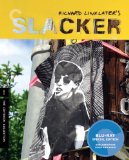| Reviews & Columns |
|
Reviews DVD TV on DVD Blu-ray 4K UHD International DVDs In Theaters Reviews by Studio Video Games Features Collector Series DVDs Easter Egg Database Interviews DVD Talk Radio Feature Articles Columns Anime Talk DVD Savant Horror DVDs The M.O.D. Squad Art House HD Talk Silent DVD
|
DVD Talk Forum |
|
|
| Resources |
|
DVD Price Search Customer Service #'s RCE Info Links |
|
Columns
|
|
|
Slacker
A day in the life of Austin, Texas
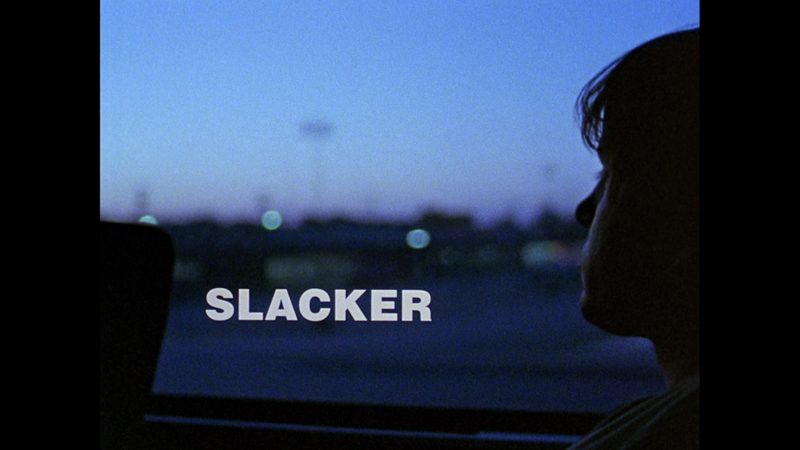
Loves: Day in the life stories, quirky films, The Criterion Collection
Likes: Richard Linklater, '90s indie cinema, the Austin concept
Dislikes: Slackers
Hates: Missing bonus content
The Movie
Richard Linklater's sprawling journey through the city of Austin, Texas is a paradox, loaded to the brim with stories but mostly free of plot. Starting with a guy in a taxi and moving through a string of over 100 characters introduced via their crossed paths, the film floats through their interactions, catching small glimpses of their lives, enough to be interesting, but not enough to get to know much about these people. The effect is not unlike mingling at a crowded party, where you spend a few minutes with a variety of people but never creating any real connections. The thing is, the people Linklater introduces viewers to are far more interesting than those you'll meet at your co-worker's Saturday night get-together.
On the way from the film's uneventful open, featuring Linklater himself, to its rather abrupt ending, you get to see a hit-and-run accident and all its repercussions, hear from a talkative conspiracy theorist and meet a strange fellow obsessed with televisions. That's just a fraction of the moments the film dips into, some for mere seconds, others for full conversations, but all worthy of your attention. You get everything from ruminations on relationships to philosophy about existence, people working on their cars and just generally crazy folk. There's a good chance if you walked through your town you'd meet many of these same characters, but there's something about Austin that draws them all, from the motormouthed woman trying to sell Madonna's pap smear to work-averse funeral-going hitchhiker. From what I've heard, Austin has changed alot since this film, but any small college town is bound to feel the same way.
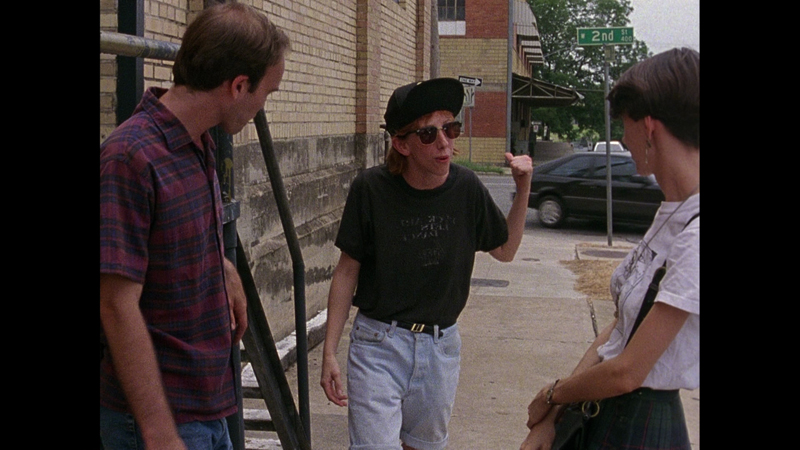
If you had no idea that Slacker was the creation of an independent filmmaker just starting out, working with a microbudget and a massive cast of mostly non-professional actors, you probably couldn't tell because Linklater's results are so incredibly polished for someone of his age and background. This is especially impressive since the movie is mainly an experiment, to the point where one scene is shot with a toy camera that recorded to audio cassette. Despite that, everything looks and feels just right, while the performances are natural to the point where some scenes come off as documentarian. As anyone who had followed his work will note, that's just his style, and some people just have that special something. I've watched many microbudgeted indies by genuinely talented people, but very few ever approach the quality of Slacker, which is the rare '90s indie that avoids feeling dated and which rises above its production-focused hype.
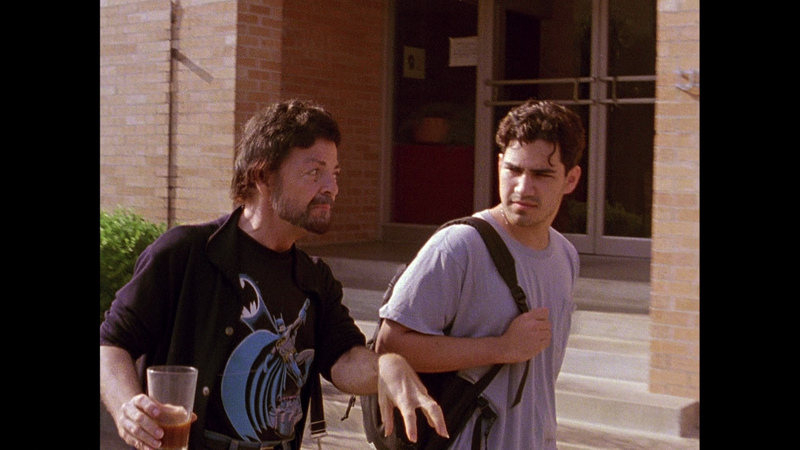
The Disc
Slacker arrives on one Blu-Ray disc, in a single-tray digipak inside a sturdy cardboard slipcover (featuring chapter stops,) with a thick, 70-page accompanying booklet. The disc, with that great Criterion standard menu, offers the option to watch the film, navigate the timeline, select chapters and check out the extras. There are no audio options but English SDH subtitles are available (just not, oddly, via the menu.)
The Quality
The 1.33:1, 1080p AVC-encoded transfer on this disc was supervised by Linklater and his DP Lee Daniel, which basically makes it the definitive presentation of the film. Cleaned up to Criterion's traditionally high standards, the image is impressive considering the film's humble origins, with imperfections that were inherent in the production effort, but nothing that distracts from the film (outside of some jitter that may bug the observant.) Some segments, like the PixelVision and Super8 scenes, have kept their issues intact, maintaining their appropriate condition. Colors are sufficiently vivid, the level of detail is quite good and there are just some minor specks in spots, while digital distractions are not a concern (though the grain is heavy.
For a film that relies mainly on dialogue recorded on the cheap, the DTS-HD Master Audio English 2.0 track is enough to carry the day, since it keeps the characters clearly legible, even when their positioning does have them speaking directly into the mic. There are no issues with distortions.
The Extras
Much of the bonus commentary is carried over from the Criterion DVD release, but several elements have been left off, including "The Roadmap," which was the film's working script, the extensive stills gallery of rare ephemera, an essay by Linklater on slacker culture and a section on Linklater's Austin Film Society. What returns however starts with not one, not two, not three...well actually it is three audio commentaries, starting with a track by Linklater himself, recorded in 2004.As you nmight expect from a guy like Linklater, the track moves smoothly as the creator talks about various production details, inspirations for characters and situations and the actors who played the parts. As the film winds down, Linklater gets a bit introspective and discusses some big-picture ideas, making for an informative, entertaining and well-paced commentary.
The second track is the cast commentary, featuring 12 of the film's actors, recorded in Austin in 2001 and 2004. Some of the most memorable characters are represented here, with most of them talking when either their scene is on the screen or when they are connected to someone on-screen, while editor Scott Rhodes and Austin performer Wammo (who both have small roles) tackle the task of filling the majority of the track with their knowledge of the Austin scene and its representatives in the film. Due to its nature, the commentary is a touch disjointed, has moments of dead air and is focused on personal observations (often about the town of Austin) rather than info about the production, but that differentiation makes it a quality supplement to Linklater's more structured track.
The final track, also recorded in 2004, is similar to the first, but brings in DP Lee Daniel (who has limited voice) and co-producer Clark Walker (who handled several crew duties) to create a conversation about this film, which focuses more on production details, including discussion of technical elements to the film. Considering that Linklater leads the way, that he doesn't repeat himself much is impressive. The feel is a bit lighter here thanks to three friends sharing the track, but if nuts and bolts aren't your thing, it may not be the commentary for you.
No Longer/Not Yet offers the chance to flip through text sequences from Slacker's original script. The opportunity to read segments that didn't make it into the film, as well as seeing how early Linklater had come up with some of the film's more defining moments makes this an intriguing read. It pairs nicely with "Ain't No Film in That Shit," a set of 13 deleted scenes and alternate takes that runs 28:24. Presented in rough format (showing how nice the actual film presentation is) most of these moments were represented in the final film in some form, though there's more from the anarchist. A few characters here are entirely absent from the movie, like a film-obsessed young man, though they weren't the greatest loss. Considering how linear the film is, that they could be removed so smoothly is further proof of Linklater's skill as a filmmaker.
The use of non-actors is one of the more interesting elements of Slacker's already-legendary backstory, and "Showing Life" helps explain how that came about, via a short text essay by casting director Anne Walker-McBay and 14:43 of cast audition tapes, which, as Walker-McBay notes, were a bit of a formality. You won't get a lot from the difficult, hum-infused audio, but the opportunity to see a bit of how the actors were chosen is appreciated. Similar in tone, in that its a bunch of footage lacking much meaning, "Taco and a Half After Ten" is 12 minutes of home-video footage from the set. What's most striking is the lo-fi effort, that just 10 years later would seem almost quaint. Continuing the archival footage theme is the 20-minute "...End of Interview!", which was captured at the 10th anniversary screening of Slacker in Austin. Featuring brief interviews with many of the cast members, and some clips from a Q&A, it's a quality look-back, with some additional bits of trivia and remembrances of several castmembers who have passed on.
Les Amis is a cafe featured a few times in the film and a once-popular spot in Austin that has since been replaced with a Starbucks. Viva Les Amis is a documentary by former waitress Nancy Higgins, and his disc has a 10-minute trailer/excerpt for the film, with short interviews with Linklater and Daniel, as well as clips from Slacker. It looks like it could be worth watching, especially the interview concept, which takes place in a cab driven by a former Les Amis manager, an obvious reference to the opening of Slacker.
While we've already enjoyed a tremendous amount of content related to Slacker, now it's time for a master class in Linklater, starting with his short film Woodshock (7:08), which he shot in Super 8 with Daniel in 1985. The film, which chronicles the '85 entry of the Woodshock concert series, a local music festival that seems like a less organized, more chill Gathering of the Texas Juggalos. Obviously inspired by the classic Woodstock concert film, this trippy documentary captures all the drunken, drug-fueled chaos, including a young, and certainly disturbed Daniel Johnston. The filmmaking skill was already present here, even if the storytelling still needed to develop.
The next step would be the 86-minute emo-titled It's Impossible to Learn to Plow by Reading Books , Linklater's first feature film, which he shot entirely by himself in 1988 on Super 8. An exercise in creating atmosphere, mostly free of dialogue, rather than a narrative film, Plow is not the rewarding experience that Slacker is, as you follow a guy through his lonely meanderings, but it is an opportunity to see the talent that Linklater eventually cultivated in its rawest form. It shares a great deal in common with many student films you've seen (read: pretentious indulgence) but the director's artistic eye is there from the beginning. The true value of this film's inclusion though is the opportunity it created for yet another commentary track, again featuring only Linklater at the mic. In addition to talking about the production of the film, he gets to cover his start in the world of film and his influences, as well as ruminating on several topics of film theory. For all those people who have been influenced by Slacker to want to make a movie, this set now provides plenty of insight into how to do it.
Wrapping up the on-disc content in this set is Slacker's original theatrical trailer, which couldn't possibly have missed the tone of the film more.
The chunky booklet that comes with the set is chock-full of content, including an excerpt from John Pierson's great Spike, Mike, Slackers & Dykes focused on Slacker, several articles about the film, items from Linklater's notebook defining the film's style, and an introduction to Linklater's first film from director Monte Hellman. The whole package is delivered with an artsy, DIY style right out of Austin, making it a fine complement to the film.
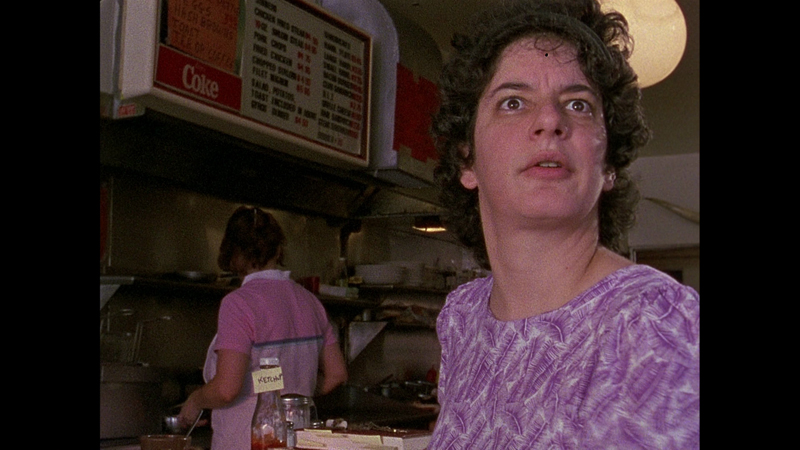
The Bottom Line
Though Slacker may not be everyone's cup of tea, thanks to its lackadaisical pace and lack of overall plot, it's incredibly well-made for an indie filmmaker just starting out and it's loaded with memorable characters. This presentation is strong on quality and heavy on bonus content, including a focus on Linklater's early films, though the absence of some of the interesting material from the previous DVD edition is disappointing. Either way, this is a hugely in-depth set and offers incredible bang for your buck putting it among the best discs on your shelves.
Francis Rizzo III is a native Long Islander, where he works in academia. In his spare time, he enjoys watching hockey, writing and spending time with his wife, daughter and puppy.Follow him on Twitter
*The Reviewer's Bias section is an attempt to help readers use the review to its best effect. By knowing where the reviewer's biases lie on the film's subject matter, one can read the review with the right mindset.
|
| Popular Reviews |
| Sponsored Links |
|
|
| Sponsored Links |
|
|
| Release List | Reviews | Shop | Newsletter | Forum | DVD Giveaways | Blu-Ray | Advertise |
|
Copyright 2024 DVDTalk.com All Rights Reserved. Legal Info, Privacy Policy, Terms of Use,
Manage Preferences,
Your Privacy Choices | |||||||









